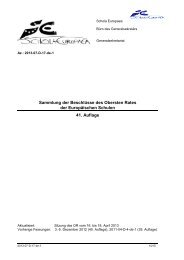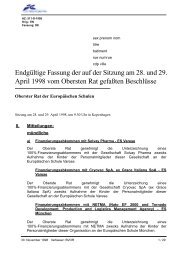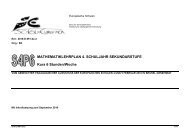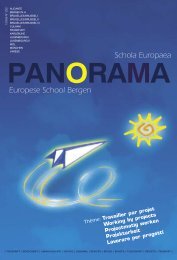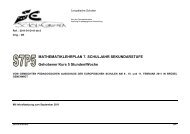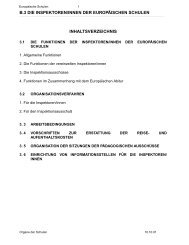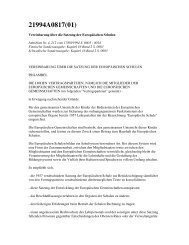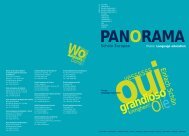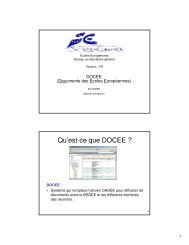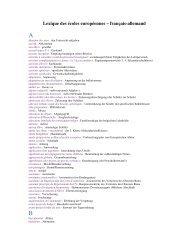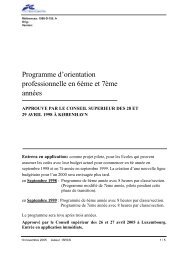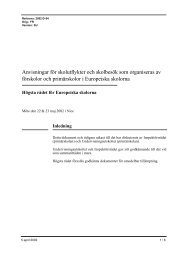External Evaluation of the European Baccalaureate (Annexes)
External Evaluation of the European Baccalaureate (Annexes)
External Evaluation of the European Baccalaureate (Annexes)
You also want an ePaper? Increase the reach of your titles
YUMPU automatically turns print PDFs into web optimized ePapers that Google loves.
conclusion”<br />
Produce a written<br />
narrative following <strong>the</strong><br />
required criteria<br />
(tense, person, tone,<br />
language level etc.<br />
Carry out activities<br />
linked to <strong>the</strong> set works<br />
set structure)<br />
(written<br />
narrative<br />
yes, but less<br />
emphasis on<br />
‘required<br />
criteria’)<br />
<br />
Content included in OCR GCE A level French (comparator syllabus) but not in EB syllabus<br />
Please list any topics that are included in <strong>the</strong> A Level specification but not in <strong>the</strong> EB syllabus.<br />
1. The topic areas from which teachers are expected to select material and on which students are<br />
assessed cover a wide range <strong>of</strong> issues from contemporary French society and culture: e.g. <strong>the</strong><br />
media, <strong>the</strong> arts, sports and pastimes, travel, daily life, <strong>the</strong> environment, education, law and order,<br />
politics, education, human interest news items etc. This applies not only to <strong>the</strong> set non-literary<br />
topics in <strong>the</strong> Culture and Society paper but to <strong>the</strong> course in general. This is in very marked<br />
contrast to <strong>the</strong> EB programme, where <strong>the</strong> source material is largely <strong>of</strong> a literary nature, requiring<br />
for <strong>the</strong> most part ‘literary’ responses.<br />
2. There is an emphasis on a variety <strong>of</strong> au<strong>the</strong>ntic sources <strong>of</strong> material and language – notably,<br />
contemporary newspaper and magazine articles.<br />
3. There is a published list <strong>of</strong> set literary texts to be studied if <strong>the</strong> student wishes to take that option<br />
in <strong>the</strong> Society and Culture paper, and set literary topics if <strong>the</strong> student wishes to take that option,<br />
but <strong>the</strong>re is no obligation to incorporate literary study. This is in very marked contrast to <strong>the</strong> EB<br />
programme.<br />
4. There is a published list <strong>of</strong> grammatical points which candidates are expected to be able to<br />
recognise and/or handle.<br />
5. There is a far wider range <strong>of</strong> assessment exercises: multiple-choice, gap-filling, non-verbal<br />
answers, sentence completion, definitions, ‘true or false’ exercises, word substitution, matching<br />
statements with items from <strong>the</strong> text etc.<br />
6. Some questions and answers are in English, and <strong>the</strong>re is a requirement to be able to transfer<br />
meaning from French into English and vice versa.<br />
7. There is an emphasis on a range <strong>of</strong> material to be communicated and <strong>the</strong> target audience, and<br />
<strong>the</strong>refore on appropriate register.<br />
8. There are specific listening comprehension tests.<br />
9. There is a general emphasis on language acquisition, ‘message’ and communication.<br />
10. Synoptic element.<br />
6



